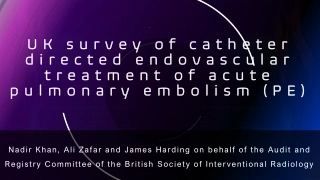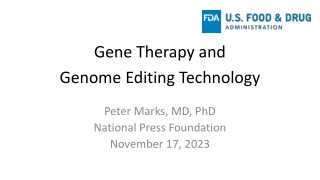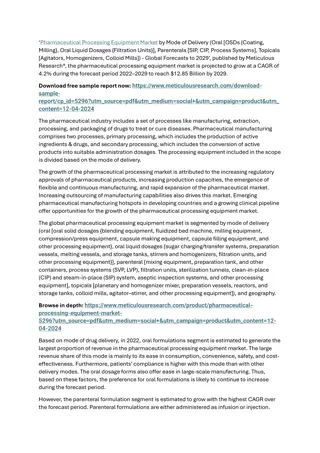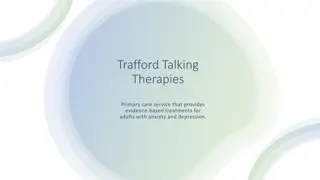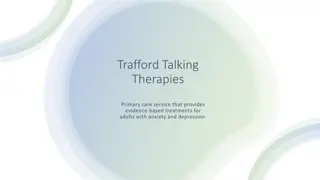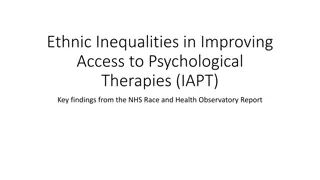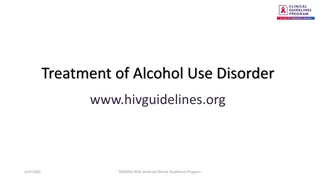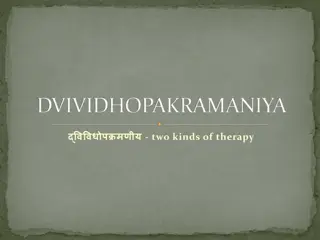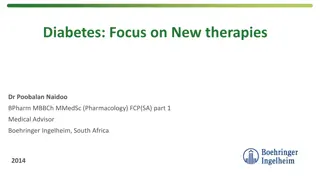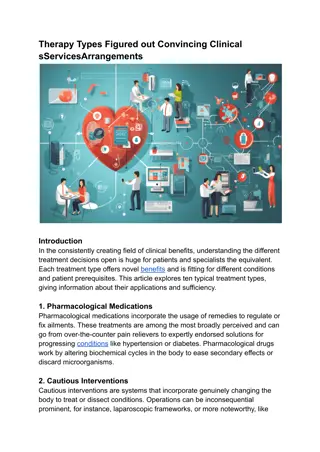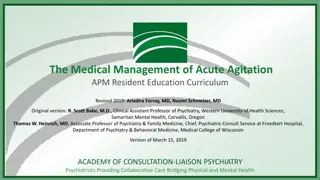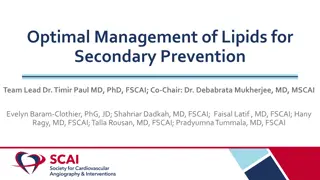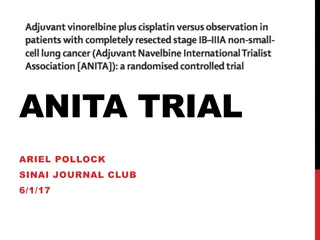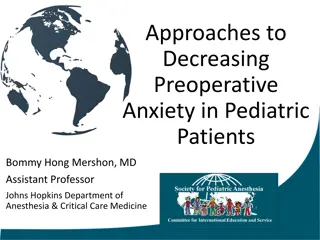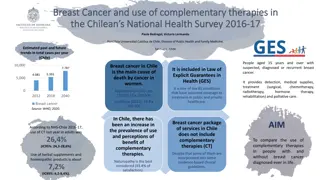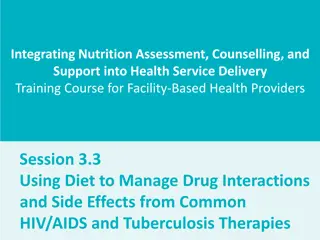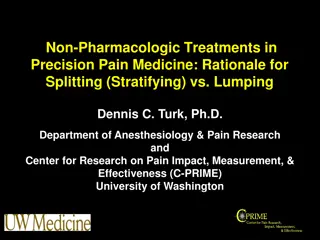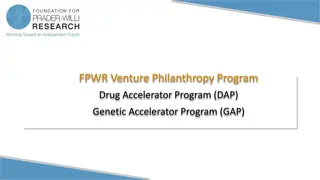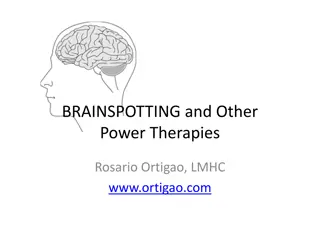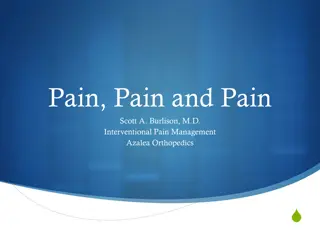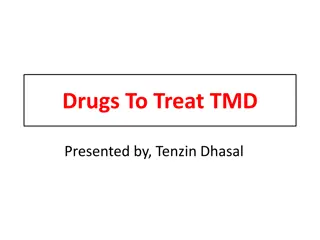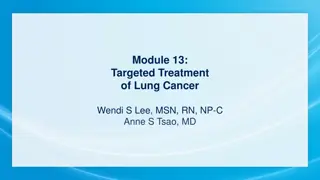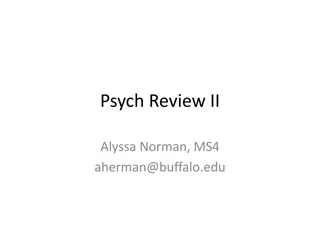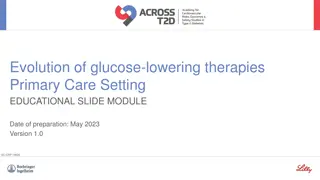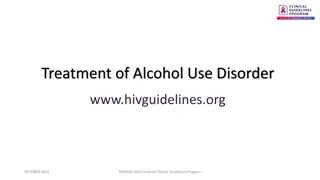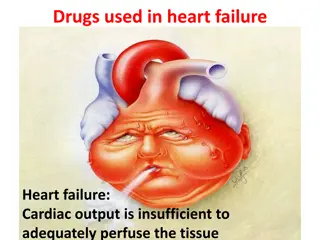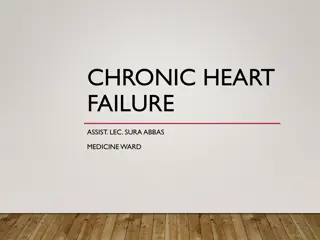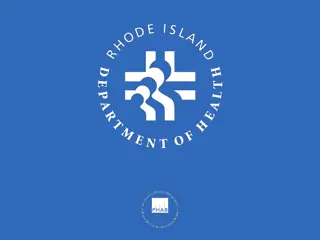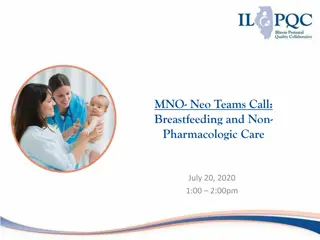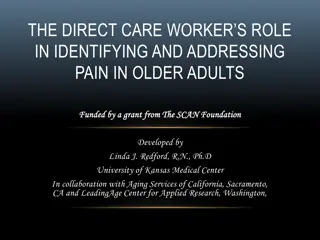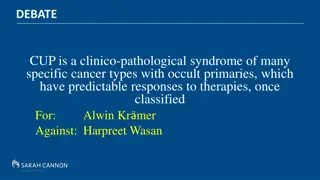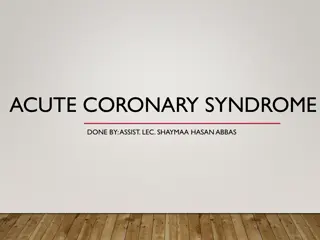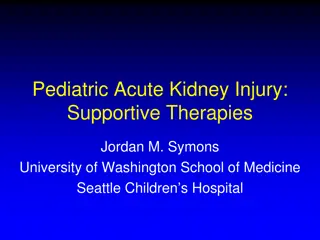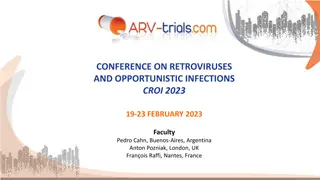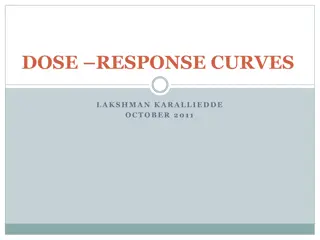UK Survey on Endovascular Treatment of Acute Pulmonary Embolism
Acute pulmonary embolism (PE) is a significant issue in hospitalized patients, with current treatments focusing on anticoagulation and systemic thrombolysis. Surgical treatments have shown poor outcomes, leading to a rise in endovascular techniques aimed at reducing clot burden. A survey conducted i
0 views • 12 slides
Gene Therapy and Genome Editing Technology
This article provides insights into the status, regulatory considerations, and delivery methods of gene therapy and genome editing technologies. It discusses approved gene therapies in the US, human genome editing in clinical applications, and the regulatory authority of the FDA over gene therapy. T
3 views • 27 slides
Opioid Use Disorder Treatment Guidelines 2024
The February 2024 NYSDOH AIDS Institute Clinical Guidelines Program focuses on assisting clinicians in engaging with patients about opioid use disorder (OUD) treatment goals, emphasizing overdose prevention, providing updated information on available treatment options, and offering recommendations f
2 views • 24 slides
Pharmaceutical Processing Equipment Market
Pharmaceutical processing includes a range of unit operations such as blending, milling, granulation, tablet pressing, coating, and filling, depending on the mode of delivery. With the growing adoption of continuous manufacturing and the rising number of novel therapies in clinical development, phar
2 views • 2 slides
Looking for the best Wellbeing in Cotham
Are you looking for the Best Wellbeing in Cotham? Then visit The Arches Therapy Rooms. Their therapy center boasts a diverse range of services delivered by a team of dedicated professionals, including counseling, holistic therapy, hypnotherapy, acupuncture, and massages. Located in Montpelier, they
0 views • 6 slides
Trafford Talking Therapies: Mental Health Support for Perinatal Clients
Trafford Talking Therapies is a primary care service offering evidence-based treatments for adults experiencing anxiety and depression. They prioritize perinatal clients from conception to 2 years postpartum, recognizing the importance of parental mental health. The service covers a range of present
0 views • 7 slides
Trafford Talking Therapies: Perinatal Mental Health Support
Providing evidence-based treatments for adults with anxiety and depression, Trafford Talking Therapies prioritizes perinatal clients from conception to 2 years, emphasizing the importance of the parent-infant relationship. They offer support for various mental health issues and deliver cognitive-beh
0 views • 7 slides
Addressing Ethnic Inequalities in Access to Psychological Therapies: Insights from NHS Race and Health Observatory Report
NHS England's efforts to advance equality in healthcare services recognize the disparities faced by minoritised ethnic groups, particularly in accessing psychological therapies. Recent findings indicate that individuals from these groups experience worse outcomes, longer wait times for assessment an
0 views • 5 slides
Embracing the Limitless Potential of Image-Guided Therapies in Interventional Radiology
Harnessing the power of image-guided therapies, the Society of Interventional Radiology (SIR) believes in pushing the boundaries of medical possibilities to improve patient outcomes, physician insights, and clinical practices. Through research-based outcomes and storytelling, SIR advocates for great
0 views • 46 slides
Guidelines for Treatment of Alcohol Use Disorder
These guidelines aim to increase the number of clinicians offering evidence-based treatment for individuals with Alcohol Use Disorder (AUD), engage more New York State residents in treatment, reduce alcohol-related deaths, and promote a harm reduction approach. They address the prevalence of binge a
2 views • 18 slides
Understanding Dvividha Upakarma: Two Kinds of Therapy in Ayurveda
Ayurveda outlines two main types of therapies - Brihmana (nourishing, enriching) and Langhana (depleting, cleansing) based on the body types of obese and lean. Brihmana therapy focuses on increasing weight and heaviness, while Langhana therapy aims to reduce weight and impart lightness. These therap
3 views • 32 slides
New Therapies for Diabetes: A Focus on Prevention and Treatment
Explore the impact of diabetes worldwide and in South Africa, with a particular focus on the epidemiology, consequences, and current therapies for Type 2 diabetes. Dr. Poobalan Naidoo discusses the increasing prevalence of diabetes and the urgent need for new therapeutic approaches to combat this gr
0 views • 35 slides
Therapy Types Figured out Convincing Clinical services Arrangements
Understanding the variety of accessible medical care therapies is fundamental for coming to informed conclusions about your well-being. This article dives into ten normal therapy types, including pharmacological therapies, careful mediation, exercise
0 views • 4 slides
Understanding and Managing Acute Agitation in Medical Settings
This resource discusses the medical management of acute agitation, covering the behavioral spectrum, differential diagnosis, non-pharmacologic and pharmacologic approaches, and case scenarios. Definitions of agitation, aggression, and violence are provided along with descriptions of component behavi
0 views • 68 slides
Optimal Management of Lipids for Secondary Prevention Team Study
Lipid management in secondary prevention plays a crucial role in reducing cardiovascular risk. This study led by Dr. Timir Paul aims to address system-level gaps in care, enhance communication for optimal therapy, and empower patients in achieving target lipid levels. By recognizing disparities and
0 views • 28 slides
Adjuvant Therapies in Early Stage NSCLC: A Review
Examining the role of adjuvant therapies in stage IB-IIIA non-small cell lung cancer (NSCLC) post-surgery. Discussion includes the impact of chemotherapy and radiation therapy on overall survival rates and the historical context of adjuvant treatment decisions. Management strategies and consideratio
0 views • 30 slides
Pediatric Strategies to Reduce Preoperative Anxiety Impact
Pediatric preoperative anxiety can lead to negative behavioral changes post-hospitalization and adverse outcomes during anesthesia. Identifying risk factors and implementing non-pharmacologic and pharmacologic interventions can help alleviate anxiety and improve overall surgical experience for child
0 views • 36 slides
Summer School on Stress - Selye International Institute 2017
The Summer School on Stress organized by the Selye International Institute in 2017 in Komarno, Slovakia, offers a comprehensive program on biologic stress, its mechanisms, pharmacologic implications, and stress management strategies. Hosted by renowned experts, the course delves into stress-related
0 views • 5 slides
Trends in Complementary Therapies Use for Breast Cancer in Chile
Complementary therapies (CT) use, including natural medicine and homeopathy, is on the rise among individuals with and without a breast cancer diagnosis in Chile. While some CTs are not included in the official healthcare package, there is increasing interest in incorporating them due to high satisf
0 views • 4 slides
Optimizing Foundational Treatments for HFrEF: Guideline Recommendations and Implementation Strategies
Highlighting the current guideline recommendations for treating patients with Heart Failure with Reduced Ejection Fraction (HFrEF), this educational slide module emphasizes the importance of implementing the recommended therapies effectively. It covers the foundational treatments recommended by vari
0 views • 28 slides
Managing Drug Interactions and Side Effects in HIV/AIDS and Tuberculosis Therapies
Learn how to identify common therapies used in HIV/AIDS and TB treatment, understand drug-food interactions and side effects, and provide appropriate nutrition assessment and support to improve treatment outcomes. Service providers play a crucial role in addressing nutritional needs and managing dru
0 views • 34 slides
Non-Pharmacologic Treatments in Precision Pain Medicine: Splitting vs. Lumping Criteria
This article discusses the rationale behind splitting (stratifying) versus lumping patients in precision pain medicine. It explores criteria for stratifying patients based on demographic, genetics, biomedical mechanisms, clinical presentation, etiological factors, and psychological response to treat
0 views • 35 slides
Foundation for Prader-Willi Research: Advancing Therapies for PWS
The Foundation for Prader-Willi Research (FPWR) is a leading organization dedicated to funding research and therapeutic development for Prader-Willi Syndrome (PWS), a complex genetic disorder. PWS poses challenges such as obesity and developmental delays. FPWR aims to accelerate the development of n
0 views • 15 slides
Understanding Brainspotting and Power Therapies for Trauma Healing
Participants in this workshop will explore Brainspotting (BSP) and other Power Therapies, learning about trauma, its effects, and the power of therapies such as EMDR, TFT/EFT, HAKOMI, PBSP, and more in addressing trauma and promoting healing through heightened bodily awareness and somatic memory ret
0 views • 19 slides
Understanding Pain Management: Acute vs. Chronic Pain and Interventional Therapies
Pain is a complex experience that can be acute or chronic, requiring different treatment approaches. Acute pain alerts us to potential injury, while chronic pain lasts longer and affects quality of life. Management options range from medical and psychological treatments to advanced interventions and
1 views • 26 slides
Understanding Temporomandibular Disorder (TMD) and Treatment Options
Temporomandibular Disorder (TMD) is a condition affecting the jaw joint and muscles, causing pain, limited mobility, and other symptoms. This article delves into the definition of TMD, its causes, symptoms, and pharmacologic treatment options including NSAIDs and muscle relaxants. Learn about the im
0 views • 29 slides
Targeted Treatment Options for Lung Cancer Patients
Explore targeted treatment approaches for lung cancer through real-life patient cases, expert insights, and updates on therapies. Learn about personalized care, innovative options, and advancements in non-small cell lung cancer treatment. Delve into disclosures from healthcare professionals involved
0 views • 49 slides
Understanding Substance Use Disorders and Their Effects
Alyssa Norman, MS4, provides a comprehensive review of intoxication and withdrawal patterns in substance use disorders, highlighting impaired control, social impairment, risky use, and pharmacologic dependence. The content covers various substances, mechanisms of action for stimulants, symptoms of i
0 views • 35 slides
Evolution of Glucose-Lowering Therapies in Primary Care Settings
Cardiovascular effects of older glucose-lowering therapies and the history of cardiovascular outcome trials are discussed in this educational slide module. It outlines the timeline of treatment options from the discovery of insulin to the introduction of various medications. Evidence regarding the c
0 views • 29 slides
Comprehensive Guidelines for Alcohol Use Disorder Treatment
The clinical guidelines outlined in this document aim to increase awareness among clinicians regarding the risks associated with Alcohol Use Disorder (AUD) and emphasize the benefits of diagnosing and treating AUD in adults. Recommendations include offering pharmacologic and behavioral treatments ba
0 views • 18 slides
Therapeutic Strategies in Heart Failure Management
Heart failure is a serious condition characterized by inadequate cardiac output. Compensatory responses include sympathetic nervous system activation, renin-angiotensin-aldosterone system stimulation, and natriuretic peptide release. Pharmacologic therapies target salt and water retention, afterload
0 views • 25 slides
Understanding Chronic Heart Failure: Causes, Symptoms, and Treatment
Chronic heart failure is a serious condition caused by various factors such as coronary artery disease, hypertension, and cardiomyopathy. It involves both left-sided and right-sided symptoms, impacting quality of life and survival. Treatment aims to manage symptoms, slow disease progression, and imp
0 views • 37 slides
Best Practices for High-Risk Pediatric Asthma Care
This resource outlines best practices for high-risk pediatric asthma care, focusing on guidelines-based approaches to assessing severity, providing education, environmental control, and pharmacologic therapy. It emphasizes the importance of asthma action plans, certified asthma educators, and enviro
3 views • 17 slides
Neonatal Care Initiative Meeting Highlights
Neonatal care initiative meeting highlights the focus on improving breastfeeding rates, reducing pharmacologic treatment, and enhancing discharge planning for optimal care of infants. The aim is to achieve key performance measures statewide, emphasizing the importance of non-pharmacologic care proto
0 views • 29 slides
Understanding and Implementing Non-Drug Therapies for Pain in Older Adults
This resource provides information on the role of direct care workers in identifying and addressing pain in older adults, funded by The SCAN Foundation. It covers misconceptions about non-drug approaches to pain, various non-drug therapies like physical positioning and music, and tips on when to use
0 views • 47 slides
Clinical Insights and Debates on Cancer of Unknown Primary Syndrome
DEBATECUP is a clinico-pathological syndrome encompassing various cancer types with occult primaries, each exhibiting predictable responses to therapies once classified. Current evidence supports CUP as a collection of specific cancer types with occult primary sites, posing challenges in primary sit
0 views • 12 slides
Understanding Acute Coronary Syndrome: Diagnosis and Immediate Therapies
A 58-year-old man presents with acute severe chest pain, diaphoresis, dyspnea, and risk factors for coronary heart disease. The most likely diagnosis is acute myocardial infarction. Immediate steps include placing the patient on a cardiac monitor, obtaining an ECG, and administering aspirin. Additio
0 views • 19 slides
Pediatric Acute Kidney Injury Management Insights
Explore supportive therapies, stage-based management, natural history, and challenges in Acute Kidney Injury (AKI) along with conservative and pharmacotherapeutic approaches. Learn about the role of diuretics, considerations in established AKI management, and historical perspectives on kidney therap
0 views • 26 slides
Study on Long-Acting Therapies and Virologic Outcomes in HIV Treatment
Faculty from different parts of the world presented at the Conference on Retroviruses and Opportunistic Infections in 2023, discussing a randomized study comparing long-acting therapies to oral treatment for HIV. The study, known as SOLAR, showed promising results in virologic outcomes at the 12-mon
0 views • 41 slides
Understanding Dose-Response Curves in Pharmacology
Dose-response curves play a crucial role in pharmacology by illustrating the relationship between drug dosage and its effects. Researchers use these curves to determine potency, efficacy, and safety of drugs, helping to establish the required dose for desired outcomes. By comparing pharmacologic pro
0 views • 13 slides
